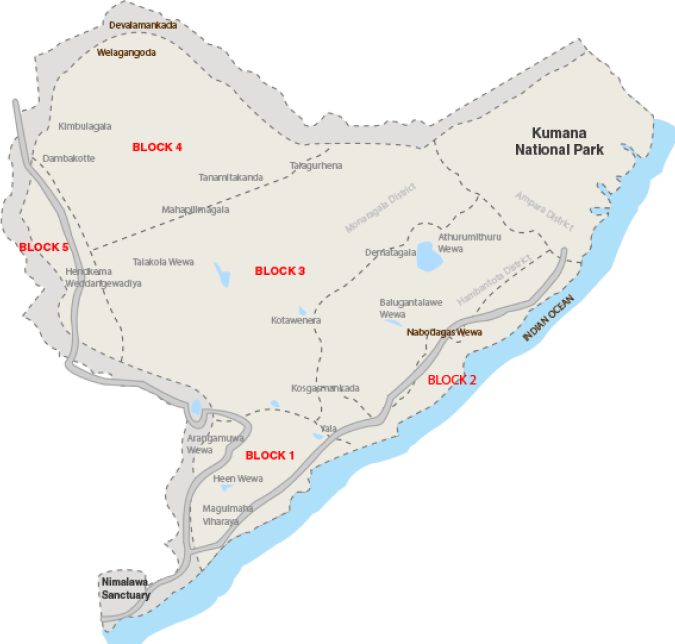Yala National Park is renowned for its thriving population of leopards, making it one of the best places in the world for leopard sightings. The park’s diverse habitats provide ideal conditions for these elusive big cats to thrive, offering visitors the opportunity to witness these majestic creatures in their natural environment. With its dense forests, open grasslands, and abundant prey species, Yala National Park offers an unparalleled safari experience for wildlife enthusiasts and photographers alike.
Yala National Park is renowned for its rich biodiversity, and among its most iconic inhabitants are the majestic elephants. These gentle giants roam freely within the park’s diverse habitats, which include dense forests, grasslands, and wetlands.
The peacock is a striking and iconic bird species found abundantly in Yala National Park. Known for its vibrant plumage and elaborate courtship displays, the peacock adds a touch of elegance to the park’s landscape.
Yala National Park is home to a variety of wildlife, including the elusive sloth bear. These unique creatures can be spotted roaming through the park’s dense forests and grasslands, foraging for food and exploring their natural habitat.
Wild buffalo, also known as wild water buffalo, are among the fascinating wildlife species that inhabit Yala National Park. These robust and formidable animals are native to Sri Lanka and can often be spotted in the park’s grasslands and marshy areas, particularly around water sources.
Yala National Park is renowned for its rich biodiversity, and among its most iconic inhabitants are the majestic elephants. These gentle giants roam freely within the park's diverse habitats, which include dense forests, grasslands, and wetlands.


Yala Block 1, located within Yala National Park, is renowned for its rich biodiversity and captivating landscapes. This section of the park is famous for its dense forests, grasslands, and water bodies, providing a habitat for a wide variety of wildlife species. Visitors to Yala Block 1 can expect to encounter iconic animals such as leopards, elephants, sloth bears, and a diverse array of bird species. The lush vegetation and scenic vistas make it an ideal destination for wildlife enthusiasts and nature lovers alike.

Yala Block 2, commonly referred to as Yala East, encompasses a portion of Yala National Park situated on its eastern flank. Recognized for its rich biodiversity, Block 2 boasts an array of ecosystems, ranging from dense woodlands to expansive grasslands and coastal stretches. Its picturesque terrain features striking panoramas and rugged landscapes. This area lies between the Manik Ganga and Kumbukkan Oya rivers, designated as a Strict Nature Reserve. Access to Block 2 is restricted and requires special permits, with exploration typically facilitated by 4x4 jeeps.

Yala Block 3, part of Yala National Park in Sri Lanka, is renowned for its diverse ecosystems and rich biodiversity. It offers visitors the opportunity to explore pristine wilderness areas, including dense forests, open grasslands, and water bodies, providing habitats for a wide range of wildlife species. Block 3 is particularly known for its sightings of leopards, elephants, sloth bears, and various bird species, making it a popular destination for wildlife enthusiasts and photographers alike. Visitors can embark on guided safaris to experience the wonders of Yala Block 3 and witness the natural beauty of this iconic national park.

Explore the untamed wilderness of Yala Block 4, a pristine sanctuary teeming with biodiversity and natural wonders. Embark on thrilling safaris through this secluded area, known for its rich wildlife sightings and breathtaking landscapes. From elusive leopards to majestic elephants, immerse yourself in the sights and sounds of nature as you traverse through dense forests, tranquil lakes, and vast grasslands. With its secluded charm and abundant wildlife, Yala Block 4 offers an unforgettable safari experience for nature enthusiasts and wildlife lovers alike.

Yala Block 5 is a lesser-known section of Yala National Park, offering a more secluded and off-the-beaten-path safari experience compared to the popular Block 1. It is characterized by diverse habitats, including dense forests, open grasslands, and water bodies, making it an ideal habitat for a variety of wildlife species. While Block 5 may not have as high a density of leopards as Block 1, it still offers excellent opportunities to spot other iconic animals such as elephants, sloth bears, crocodiles, and a wide array of bird species. With its serene atmosphere and abundance of natural beauty, Yala Block 5 provides a unique safari experience for nature enthusiasts looking to explore the untamed wilderness of Sri Lanka.